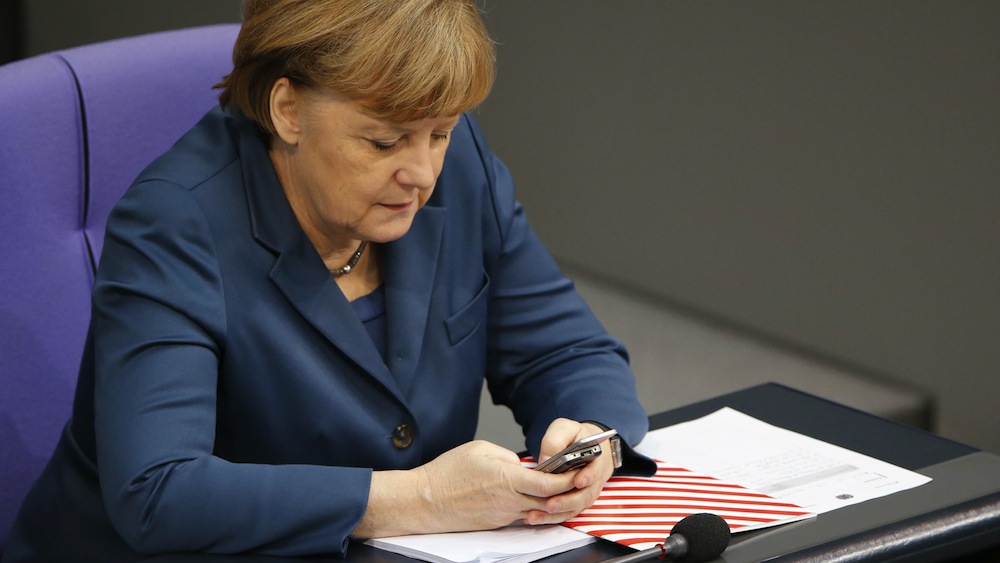Berlin’s scandal-starved opposition senses blood in the water. Has Germany’s foreign intelligence service broken the law in assisting America’s ever-data- and information-hungry National Security Agency?
In the proud tradition of Casablanca’s crooked police chief Captain Renault, Chancellor Angela Merkel said in 2013 that she was shocked, shocked, to learn from Edward Snowden that the NSA was spying on European companies, EU institutions, and even on her own mobile phone. Spying on friends, she said gravely, is just not on.
Last week the more world-weary among us in Berlin learned what we already suspected: spying on friends is most certainly on. And when it comes to US-German relationship you might even say: that’s what friends are for.
After a nearly banana-skin-free decade in power, Merkel is braced for the worst after claims that NSA surveillance in Europe was either enabled by or outsourced to Germany’s foreign intelligence service. The Bundesnachrichtendienst (BND) is accused of processing over 40,000 requests from the NSA to spy on people, businesses, and institutions in Europe. Among the reported targets: German companies, the EADS aerospace consortium, and even French government officials.
Starting in 2002 – on the basis of a new “memorandum of understanding” between both agencies following the 9/11 attacks – the NSA sent surveillance requests to the BND with targets identified by so-called “selectors” – email address, telephone number or the unique IP address of a computer’s internet connection. These targets were then observed by the BND via its listening post in Bad Aibling, south of Munich, and the collected data forwarded to the NSA.
It is unclear how many such “selectors” were filed by the NSA, though estimates range from several hundred thousand to more than a million. Seven years ago BND employees noted thousands of these computer-automated requests did not come under the terms of the agreement with the NSA. What happened next is still unclear. The BND says it quietly filtered out the illegal search requests, didn’t tell the NSA but reported the agency’s growing interests to the chancellery in 2008 and 2013.
A subsequent search turned up 2,000 problematic NSA requests but the chancellery denies it knew anything until it was told. Merkel spokesman Steffen Seibert has stuck to a script that the chancellery subsequently asked the BND to remedy without delay “technical and organizational deficits” identified at the intelligence agency. What these “deficits” are, no one wants to say. Two years after it was informed, the chancellery says it needs more time to investigate.
News of the alleged BND activity has caused uproar at an ongoing NSA Bundestag inquiry, with its chairman Patrick Sensburg from Merkel’s own ruling Christian Democratic Union (CDU) expressing amazement that “no-one drew a line and said: ‘This isn’t okay.’”
The committee is sorting through testimony collected so far from the BND and the chancellery. Such as the insistence that the BND-NSA co-operation represented a “know-how gain” for the German spies involving “no activity against German interests.” Or the interior ministry’s response to a query from the Left Party on April 14, denying that it had any knowledge of NSA economic espionage. That could come back to haunt the government because the BND says it told the chancellery of the NSA’s repeated attempts to collect information on European companies a month earlier.
Interior minister Thomas de Maiziere – formerly the chancellery’s chief-of-staff – has denied the BND-NSA co-operation was illegal. Government sources insist the NSA has a legitimate interest in European companies that it suspected of trying to get around trading sanctions.
But what of the alleged spying on French officials? Berlin’s scandal-starved opposition senses blood in the water. “The chancellery is the supervising body of the BND,” said Gregor Gysi, Bundestag leader of the opposition Linke. “Either they didn’t know, and their supervision was useless, or they knew, and they involved themselves in illegal actions.”
The Linke and the Greens say that, even before all details are known, the revelations indicate how Berlin’s outrage after Snowden’s NSA allegations was a show put on by German officials anxious not to cross the US and risk exclusion from intelligence alliances. If the scandal continues to build in this fashion, Angela Merkel has the choice of two dents to her credibility: admit she didn’t know what her intelligence agency was telling her office about the NSA, or concede that her reaction to US spying was, as many suspected all along, just a holier-than-thou pantomime.
The question Germans want answered: because their intelligence agency couldn’t beat the NSA did it join it – with Berlin’s blessing?







